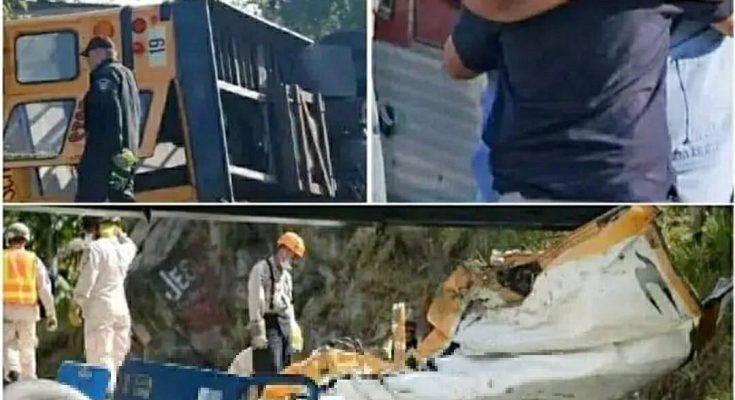Tanzania was plunged into collective mourning when a devastating school bus accident in the Karatu District claimed the lives of 32 children, two teachers, and a driver. The tragedy, which involved students from Lucky Vincent Primary School in Arusha, remains one of the darkest moments in the nation’s history—a wound that time has softened but not erased.
What began as a morning filled with excitement and purpose ended in unthinkable loss. The children were on their way to Karatu to participate in a mock national examination—an important milestone for the bright, hopeful students who dreamed of shaping their futures through education. The journey was meant to be routine, a short trip across the scenic hills of northern Tanzania. But heavy rain had made the winding mountain roads dangerously slick, and as the school bus navigated a sharp bend, tragedy struck.
According to official reports, the bus lost control and veered off the road, plunging into a deep ravine. The crash was catastrophic. By the time rescuers reached the site, the twisted remains of the bus were barely recognizable. The images that emerged that day shocked the nation—tiny school bags strewn across the muddy hillside, textbooks scattered in the rain, and families gathered in disbelief as emergency crews worked through the wreckage.
News of the disaster spread quickly across Tanzania and beyond. Regular programming on national television and radio was interrupted for continuous coverage. Newspapers printed black-bordered front pages. Within hours, President John Magufuli declared three days of national mourning, calling it “a tragedy that has broken the heart of the nation.” Flags were lowered to half-mast as communities across the country gathered for vigils, prayers, and candlelight memorials.
In Arusha, hundreds of people filled the grounds of Lucky Vincent Primary School, clutching photographs and flowers. Teachers, parents, and classmates wept openly, united by a grief too heavy for words. The children who perished were not just students—they were sons, daughters, and friends whose laughter had filled classrooms and homes only days earlier.
Yet amid the devastation, a glimmer of hope emerged. Three students—Wilson, Sadia, and Doreen—were pulled alive from the wreckage. Severely injured but conscious, their survival was described as miraculous. Their story quickly spread worldwide, symbolizing resilience in the face of overwhelming tragedy. Following urgent coordination between local authorities and international aid organizations, the three survivors were flown to the United States for specialized medical care.
Their recovery became a testament to human compassion and global solidarity. Tanzanians at home followed their progress closely, offering prayers and messages of encouragement. The children’s courage inspired many, even as the nation continued to mourn the dozens who had not survived.
In the aftermath of the tragedy, difficult questions followed. How could such a catastrophic accident have happened? Could it have been prevented? The incident sparked a national conversation about road safety, driver qualifications, and the condition of school transport vehicles in Tanzania.
Government officials promised reforms—stricter licensing standards for drivers, mandatory vehicle inspections, and improved road maintenance in high-risk areas. For a time, enforcement increased, and awareness campaigns were launched in schools and communities to emphasize road safety. But years later, critics argue that many of those promises have faded with time. Poor infrastructure, overworked drivers, and aging vehicles still plague many parts of the country.
Nevertheless, the Karatu tragedy remains a powerful reminder of what’s at stake. Every anniversary brings renewed calls for accountability and reform. Community leaders and parents’ associations continue to advocate for stronger safety measures to ensure that no family ever endures such heartbreak again.
At the memorial site near Karatu, a stone monument now bears the names of the 32 children, the two teachers, and the driver who perished that morning. Visitors leave flowers, letters, and school supplies in tribute. The site is quiet but never forgotten—school groups visit annually, and locals speak of it with reverence. “This place reminds us of the importance of protecting our children,” said one teacher from Arusha who brings her students every year. “We come to honor them and to remember that safety is not a privilege—it is a duty.”
For the families, the pain has never fully faded. Some parents have since moved away from Arusha, unable to bear the daily reminders. Others have stayed, forming a small support network to keep the memory of their children alive. Each year, on the anniversary, they gather to pray and to share stories—about birthdays missed, drawings left unfinished, dreams unfulfilled. “Time has passed,” one mother said during last year’s ceremony, “but for us, that morning feels like yesterday.”
The story of the three survivors continues to inspire hope amid loss. Now young adults, Wilson, Sadia, and Doreen have each spoken publicly about the experience that changed their lives forever. They have expressed deep gratitude for the support they received and have called for lasting improvements to transportation safety in Tanzania. Their resilience stands as a living legacy of the classmates they lost.
Eight years on, the Karatu bus tragedy has become more than a story of grief—it is a symbol of national unity and a call to action. The country has made strides in education, infrastructure, and public awareness since 2017, but each rainy season renews the collective anxiety over road safety in rural regions.
Tanzanians still remember where they were when they heard the news that day. For many, it was the first time a single event had united the nation in mourning. Religious leaders from all faiths joined together to lead prayers. Artists composed songs and poems in tribute to the young lives lost. In classrooms, teachers spoke to their students about compassion, resilience, and the value of life.
As the eighth anniversary passes, flowers once again adorn the memorial in Karatu. Candles flicker in the twilight. The names of the children are read aloud, each one followed by a moment of silence. In those brief pauses, the weight of memory lingers—a reminder that even as years pass, some losses never fade.
The Karatu tragedy is no longer just a headline from the past; it is a chapter etched into Tanzania’s national consciousness. It taught an entire country the price of negligence and the power of unity. And as people gather to honor the young lives cut short, one message echoes through every speech, every tear, and every prayer:


